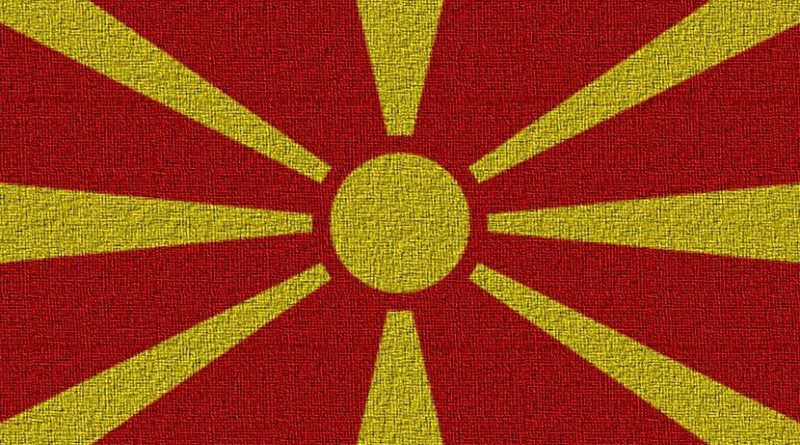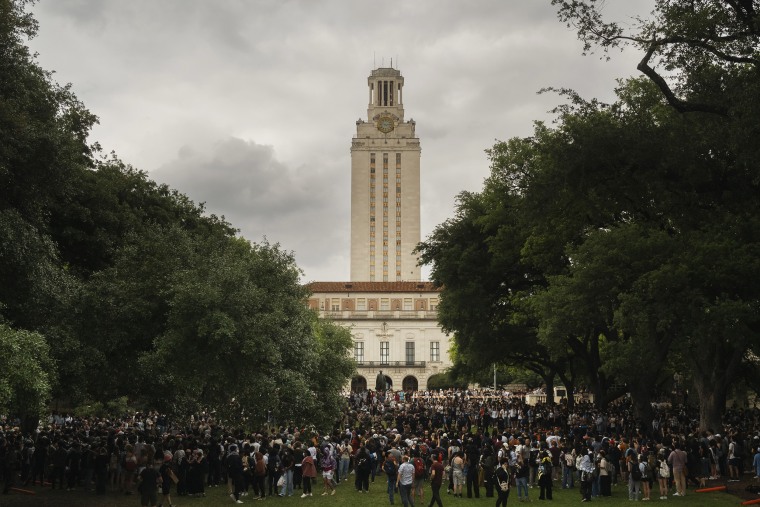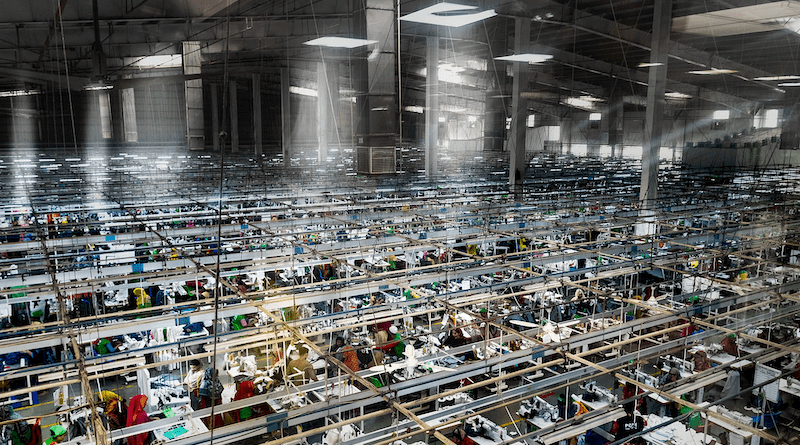Elections In North Macedonia Bring Us Back To The Era Of Pjetër Bogdan – OpEd

Flag of North Macedonia
There is a gap between the expectations from the elections in North Macedonia and the reality in the sphere of geopolitics. North Macedonia should not fall into the trap of ethno-nationalism.
Introduction
The results of the presidential elections that took place this week in North Macedonia were as expected. In the first round, VMRO candidate Gordana Siljanovska/Davkova won.
This victory pushed North Macedonia into the slippery slope of political instability. After all, this was also the purpose of the Russian and Serbian intervention. The West again, similar to Montenegro, rained late!
These elections, especially those for Parliament, which are expected to be held on May 8, will give this fragile state the geopolitical weight it deserves. This result is a kind of product of the naivety of the so-called modern politicians of the Albanian political space.
As a Nation, as these elections also proved, we urgently need coordination in the field of political action strategy. Macedonians who feel themselves nationalists proved to be an absolute majority. Meanwhile, they will line up even more strongly in the so-called anti-Western front, somewhat similar to the majority of citizens in Montenegro. This was the trap they fell into.
North Macedonia in the whirlwind of geopolitical storms
VMRO-DPMNE is returning to power after a review and reorientation of the national political agenda. The ideologues of this political force seem to have strayed too far from its basic objectives. The party believes that its goals and objectives are the expression of the tradition of the Macedonian people on which the political struggle and its concepts are based.[1]
Let’s remember the fact that this party was founded under the name VMRO-DPMNE on June 17, 1990 in Skopje.[2] Since the process of the disintegration of Yugoslavia had begun and there was a real danger of Macedonia being devoured by Serbia, its founders would immediately contact the Bulgarian authorities to ensure the existence of Macedonia as an independent republic. In Sofia they assured that if Serbia would invade Macedonia, then Bulgaria would use all necessary means to oppose it.[3]
If VMRO-DPMNE’s leading ruling elite has rightly been criticized for its “antique” policy (known locally as “Antikvizacija”), in which the country seeks to appropriate ancient Macedonian figures such as Alexander the Great and Philip II Macedonia,[4] in an effort to build a new identity, different from the Bulgarian one, the current leaders are gradually returning to the Slavic Belgrade-Moscow axis. This reorientation of what is the truth has started since the time when this political force was led by Nikola Gruevski.
Meanwhile, in 2015, the former prime minister and leader of the VMRO-NP, Ljubço Georgievski, would oppose the serbian policies of his predecessor. In an interview for Radio Free Europe, he expressed his opinion that “the previous government had a clear goal: to keep the country closer to Serbia and in a future phase to join the northern neighbor.” According to him, “a classic pro-Yugoslav policy of Serbization was being developed, where confrontation with all other neighbors was being sought, but the border between Macedonian and Serbian national identity was erased.” [5]
“Stop the Serbian absorption of the Macedonian nation” was the motto of the advertisements then placed on the streets of Skopje, through which the Party launched the campaign for the preservation of the Macedonian national identity. The pro-government press claimed that the “Bulgarian” Georgievski organized a new provocation. As a result, the signs were quickly removed by the VMRO-DPMNE authorities. [6] The comeback had just begun.
The agreement with Greece would help this return, while membership in NATO would guarantee the survival and existence of the Republic. Thus, the way was being opened for the march towards the EU. But, in this context, the leaders of this multi-ethnic state could not be sure of a clean success: its prospects have been anything but clear since Greece vetoed its neighbor’s candidacy at the NATO summit. in Bucharest in 2008 due to the name conflict,[7] which will also be followed by Bulgaria’s condition regarding the constitutional position of the Bulgarian minority.
Only those who made up and make up over 1/3 of the population, i.e. the Albanians, did not put forward any conditions! At least not until the spring of 2001, when the National Liberation Army ended the experiment with the Albanians and imposed the Ohrid Agreement.
It was exactly the compromise presented by the Ohrid Agreement that guaranteed the Albanians a thread of moral and political dignity, but also that ended the war, that had brought into question the survival of Macedonia as a state.
Eleven years later, in a symbolic gesture of reconciliation, Greece would become the first country to ratify North Macedonia’s accession to the alliance.
On the road to North Macedonia’s alignment with the EU, as we stated above, another obstacle that North Macedonia faces on its way to European integration is, surprisingly, its now strained relations with Bulgaria.
North Macedonia thus returns to the whirlwind of geopolitical storms.
In September 2019, Bulgaria sent official Skopje a list of conditions that had to be met if they hoped to receive support for EU membership. The list includes twenty items with specific deadlines carefully aligned with the dates of pre-trial hearings.
One of them involves the withdrawal of the Macedonian side from any claims related to the Macedonian minority of Bulgaria. In addition, any mention of a “fascist Bulgarian occupation” should be removed from all historical monuments and commemorative plaques. In this context, a polishing process should be initiated that aims to remove all ex-Yugoslav communist activists from the state apparatus. Harmonization of the content of the history texts of the two countries is another condition of the Bulgarian side that must be fulfilled in order for North Macedonia to count on ratification from its eastern side.[8]
But in all this clash, the essence of the political disagreements in the Skopje-Sofia relationship is revealed – it is language. Bulgaria demands that the European Union not use the term “Macedonian language” in the accession talks, but rather the term “official language of the Republic of North Macedonia”.
This insistence is consistent with the Bulgarian view that Macedonians are actually Bulgarians. Bulgaria itself sees Macedonian as a Bulgarian dialect.
Under the motto “proud of North Macedonia”, Siljanowska-Dawkowa, the candidate for president from VMRO-DPMNE, brought back the issue of the country’s integration with the West into the focus of her election campaign. She and her party returned the ethno-nationalist vocabulary to the center of the field, promising that upon coming to power they will put an end to “the national humiliation that Skopje had to endure under the social democrats by making compromises for the sake of EU and NATO integration. “
In this case, it is about changing the name of the country, which Greece, a member of the EU, had conditioned, promising to give up the veto against the start of membership negotiations between Brussels and Skopje.
North Macedonia has been a candidate for EU membership since 2005. Between 1991 and 2017, the country was called the “Republic of Macedonia”. In 2017, this dispute was resolved and the country was renamed the “Republic of North Macedonia”. Then, North Macedonia’s neighbor, Bulgaria, will begin to take over the role of Greece – that of the blocker of this process.
Basically, the dispute between Skopje and Sofia is about culture, history and tradition, that is why we have Sofia’s request that the Bulgarian minority of North Macedonia be clearly highlighted in the preamble of the Constitution of North Macedonia.
This change will be significant for the future of North Macedonia. He demands a two-thirds majority, which VMRO-DPMNE, which is meanwhile considered pro-Russian and pro-Serbian, has not accepted. Will he be able to resist even after coming to power, it is not very reliable.
At this point, she may have the first difficulties even with the Albanian partner of the coalition.
Constitutional changes are thus essential for overcoming the unitary mentality that VMRO-DPMNE has cultivated. Until then, VMRO-DPMNE would be able to give up unitarist and chauvinistic policies, while the plural multicultural life would be reflected in the real political life in North Macedonia.
But the strained relations between Skopje and Sofia must first of all be seen in the new geopolitical context. Therefore, the North Macedonian elections were the subject of many reports in the Bulgarian and Albanian media [in Kosovo and Albania].
On the Bulgarian web portal mediapool.bg, a reader comment on the election result wrote: “Further proof that Macedonians are Bulgarians.” Meanwhile, the noise of the Albanian media in Tirana and Pristina was dominated by the political battle for the preservation of the status quo led by the Albanian Prime Minister, Edi Rama, and that in the background is the return to the Open Balkans project.
The return to the logic of redefining the limits of influence in accordance with the regional geopolitical identities that are being created, taking into consideration the interests of the states that will conclude the process of the nation-state cannot be considered as modern constructions.
The oldest of these boundaries, with the greatest extent, was that between East and West – or rather: between Asia and Europe, between Orient and West. This tendency is also observed in the depths of the centuries – in antiquity, when Aristotle emphasized the contrast between the democracy of the Greek polis and the despotism of the Persian king.[9]
The wars between the autochthonous peoples – the Illyrians and the Thracians in the face of the Slavic influx since the 6th century of our era, such as the earlier ones of the Greeks with the Persians and later against the Romans and Parthians, were the military expression of this demarcation, which totally the present clash of the Pre-Red [NATO] with the East [first of all with Russia].
Meanwhile, the Albanian-Serbian confrontation and rivalry took on new colors since a part of the elite
Serbian culture adopts the ideas of the European Enlightenment [let’s remember the war diary of Dimitrije Tucovic, the journalistic writings of Kosta Novakovic…]. This world contrast is revised, accepting the Serbian genocide of the Albanians in accordance with Hegel’s perspective, in whose philosophy of history the stagnant Oriental world is contrasted with the advancing Greek, Roman and Germanic world.
Geopolitical identity in the making
The border between Europe and Asia, progressive scholars judge, is also a construct, since Europe is not a separate continent in the geographical sense, but only the western appendage of the Eurasian land mass.
The westernmost limit was drawn by Ewald Banse (1912). It runs from St. Petersburg to the mouth of the Danube in the Black Sea; it includes the Baltic states, but already defines Belarus and Ukraine as part of Europe. While Ukraine continues to be the front of the war between the East and the West, Belarus is being filled with mouths of Russian nuclear weapons, while the extension of this influence towards the Balkans remains a strategic objective not only of Russia.
Whereas today, when the war in Ukraine has entered its third year and there is no end in sight, geopolitical identities are being reviewed in their entirety, while in Southeast Europe they are adapting to the new circumstances. Those borders are being anchored in the consciousness of people, even those who were able to fight for the dissolution of Yugoslavia, through intellectual and political efforts, there is a tendency to justify the return to the Open Balkans project, which is de facto the new Yugoslavia without Croatia and Slovenia, but with political Albania!
Even within Europe, the old borders have already changed radically. That is why we had a war in the Balkans in the last decade of the last century; that’s why we have war in Ukraine today.
The border between the Orthodox Church and the Catholic Church, the border between the Habsburg Empire and the Ottoman Empire – the latter in the Balkans now, have become the border of “core Europe”. Russia’s attempt to bring under its influence, in addition to Serbia and the Republika Srpska [Bosnia and Herzegovina], also Montenegro and North Macedonia, means a new battle between the East and West in the process of finalizing the borders of the new identity. geopolitical. Meanwhile, Skopje can return to a center that gives specific weight to this geopolitical identity, not only on the cultural level, but also on the political and military level.
We are returning to the positions we were in the era of Pjetër Bogdan.
In the era of Bogdan, Europe’s confrontation with the invasion of the East in the Balkans had just begun, even in the ideological and cultural domain that accompanied the Ottoman Empire (and Islam), it was the Albanians who were becoming front-line fighters, respectively shield of western civilization. This was not something accidental: the Albanians were the eastern extreme of this civilization. Where there were no more Albanians, Western civilization ended. Skopje was therefore the center of the Diocese of Arbers in this part of Albania.As Pjetër Bogdani teaches us, the Slavs (Serbs) therefore called Catholicism as “Arbanashka vera” [Religion of trees].
May 8 elections – the three possible scenarios
North Macedonia is actually in a position where it has to be determined for one of the three possible scenarios:
The first scenario – Starting after the May 8 parliamentary elections, we will have the coalition between VMRO/DPMNE and VLEN. This scenario was warned by the chairman of VMRO, Hristijan Mickoski.
Meanwhile, VMRO-DPMNE entrusted him with the negotiations for the formation of the new parliamentary majority.
Mickoski from the first appearance, starting after the communication of the official results for the victory of the candidate Gordana Siljanovska, sent a public message to the Albanian opposition, inviting it to be part of the change, even expressing his willingness to talk about the participation of the opposition. Albanian in the next government after May 8.
In the following days, he received an indirect answer from Arben Taravari, reminding him of the main condition: the constitutional changes through which the two entities: the Macedonian entity and the Albanian entity, share ownership of North Macedonia equally.
In Skopje, the coming to power of the Young Turks [Young Turks] began in 1908 with the support of the Albanian lobby. They came to power first of all with the strong support of the Albanian lobby in Constantinople and made great promises to change the situation in the Empire.
VMRO-DPMNE is clear that the fate of North Macedonia is closely connected and completely interdependent with the position of the State towards the national freedoms of the Albanians.
Albanians at this turning point for North Macedonia, with real opportunities to contribute to it moving with accelerated steps towards EU integration, will not tolerate the MV falling into the lap of Serbian-Russian geopolitical interests.
This scenario can only succeed if VMRO-DPMNE has understood that MV is as much their homeland as it is Albanians’.
Second scenario – The second scenario implies political paralysis in the country. Of course, if the Albanians would not agree to become a decorum of the VMRO-DPMN power. This could impose the creation of a governing coalition from the loser of the Macedonian bloc – the SDSM together with the two factions of the Albanian bloc. This scenario, however, will not be sustainable. Therefore, Macedonia risks sinking into the cycle of deep political crisis and instability of its own kind.
The third scenario – It can be defined as the exit gate from the possible crisis. It has to do with the creation of a technical, comprehensive Government, with a limited term of government, for one year, which would be enough to prepare the ground for special elections.
This scenario can become a reality if the diplomatic diplomacy understands the seriousness of the crisis where the situation in North Macedonia can slip and intervenes in time.
The VMRO-DPMNE trap – A black hole for the region
Sun Tzu said: “Don’t interrupt your opponent while he is making mistakes.” Should the Albanians let VMRO-DPMNE deepen the mistake and sink further into the trap it created?!
In these circumstances, when Macedonian nationalism is on the rise and waiting to take power, the Albanian parties must demonstrate an even greater national and political maturity, making votes together with those progressive forces in Macedonian society which are more immune to Russian-Serbian influences in Macedonia. Belgrade and Moscow are committed to Macedonia remaining a black hole to prevent EU and US reflectors from shedding more light on the region’s future.[10]
The political platform of both blocs within the Albanian electorate needs to rise above narrow interests, when the issue is the position of the Albanians in North Macedonia as a state-forming party; it has an urgent need for consensual spirit in this plane and unity of action.
Albanians should definitely not fight for power, the publicist and writer Emin Azemi rightly insists, before they have clarified the common vision on the cooperation strategy with the Macedonian political parties.[11]
Even under these circumstances, this strategy would have to be fully in line with the pre-modern spirit of the geopolitical realignment that is unfolding before our eyes.
The possible creation of a coalition between WMRO and VLEN should therefore be based on several essential preconditions:
1. VLEN should make it even clearer, first of all for the Albanian electorate, especially now on the eve of the second round for the election of the president and for the elections for Parliament, what is the position of this coalition in relation to “Open Balkan”?!
2. VLEN must clearly and unequivocally inform the party leader and the coalition partner – VMRO that any cooperation with Serbia and Vučić that would benefit the strengthening of Serbia’s hegemonic positions in the region are unacceptable. Consequently, renouncing the Open Balkans and commitment to the Berlin Process is sine qua non and of vital interest for both Macedonians and Albanians of North Macedonia.
3. It should be clarified what is the position of Mickovski and VMRO regarding the constitutional changes and how the Albanians will be treated in this process. What will be the position of Albanians and that of the Albanian language, respectively its treatment in state and public institutions, etc.
4. VLEN has a moral and political obligation to clarify in advance the position of the future Prime Minister of North Macedonia, how the investment policies in the municipalities with an Albanian majority will be handled and what the concrete projects will be?
Conclusion
In this political battle between the West and the East in Macedonia, with this current re-alignment of VMRO-DPMNE, the identity of the Macedonians will fade every year and more, while the position of the Albanians can return to the state when they were forced to take weapons in hand and to secure their dignity and life by force. The statement made public on April 30 of the VMRO’s candidate for president of the Republic, in Kumanovo, returning to the accusations of alleged “crimes against humanity” committed by the Albanian National Army [UÇK], and of “recall” effects as a lawyer who is , it is stated that “acts against humanity never become obsolete”,[12] they are ominous for the future of North Macedonia.
It seems that without the authoritarian mechanisms and patronage of the West, the future of North Macedonia is again being questioned. See for this, there is a high probability that our generation will be eyewitnesses of how a geopolitical project will collapse before our eyes, and with it the Macedonian nation and state.
________________________
1. The party politics in Macedonia, 1993, Skopje, G. Ljubancev
2. Walking on the Edge: Consolidating Multiethnic Macedonia, 1989-2004, Židas Daskalovski, Globic Press, 2006 (page 46)
3. Красимир Каракачанов пред Васко Ефтов: През 1990 г. България гарантира сигурността на Р Македония. 04.04.2011г
4. Macedonia profile, BBC News Europe, 23 October 2012
5. Радио Слободна Европа, јануари 23, 2015, Марија Митевска, Србизација на Македонија?
6. Po aty
7. https://www.treffpunkteuropa.de/nordmazedonien-im-aufwind-oder-im-auge-des-sturms?lang=fr
8. Po aty
9. https://www.blaetter.de/ausgabe/2017/mai/das-ost-west-konstrukt
10. Emin Azemi: https://www.facebook.com/emin.azemi.7
11. Emin Azemi: https://www.illyria.com/lakmicaret-qe-duan-te-behen-me-zor-pushtetare-pa-votat-e-shqiptareve/?fbclid=IwZXh0bgNhZW0CMTAAAR2jzEGMCI7YzOC5pRu0CgogFcI3Iwye3ROqmRlRgwBz_xjUu-Jj22nVC_o_aem_AZziiRZzqgo8QNDK7lFJxl9wdfsg2LeITF-EtoC42v8B66fTpimfB9blnN8IuTLTTjPa4puSjGwSDpAsl6_xgBYI
12. https://lajmpress.org/siljanovska-propozoi-tribunal-nderkombetar-per-luften-e-vitit-2001/

Dr. Sadri Ramabaja
Dr. Sadri Ramabaja was born on October 4th, 1961 in the Village of Gollak, in the town of Dardania, Republic of Kosovo. Dr. Ramabaja has been an active member of the National Albanian Union Party for over fifteen years (1990-2005) until this political party ceased to exist and later on actively participated in the Social Democratic Party of Kosovo. Since 2010 has emerged as one of the leaders of the Self Determination Movement while promoting the main principles of this alliance and is a member of the National Assembly of Prishtina for two terms. In 1983 he was arrested by the Serbian Secret Service for his active role in Kosovo’s quest for independence. Thereafter Dr. Ramabaja was jailed as a political disident for three years in the penitentiary of Vraja. During his residence in Switzerland (1987-2002) he continued his University studies in Tirana, and his postgraduate studies in the University of Basel, in the European Studies Institute. For three years in a row (1987-1990) Dr. Ramabaja was the editor of VOICE OF KOSOVO, a newspaper published in Switezerland. During the years 2001-2004 he was the professional collaborator for Communications Media at the OST Institute-West in Bern, Switzerland. In 2002 returned to Kosovo and continued with his post-graduate studies at the College of Law and International Relations, where he graduated with a Masters Degree in International Law Sciences. In 2004-2006 Dr. Ramabaja served as a Senior Political Adviser in the Office of the Prime Minister of Kosovo. In November 2008 was a PHD Student of Political Sciences and International Relations, in the European Center for Peace and Development (ECPD) at the Peace University of the United Nations. In 2012 was transferred at the Graduate School of the European University of Tirana, to continue with his postgraduate degree defended through the presentation of his dissertation: “Albanian Federation-Cohesion of a Nation-State and the European Union” Dr. Ramabaja, has been published abroad in many renowned newspapers and magazines; has published eleven scientific and research papers in the field of international affairs and geopolitical studies. He is a Fellow of the International Political Studies Institute of Skopie, Macedonia. Dr. Ramabaja is the author of four Books in Albanian Language: “Realizmi politik dhe çështja kombëtare” (Tiranë, 1998); “UE-ja shpresë apo ringjallje utopish” (Prishtinë, 2003); “Gazetaria” (one of four co-authors of this university text book- Tiranë,2002); “Feniksit ia gjeta çerdhen”(Poetry - Tiranë, 1993); “Federata Shqiptare – Kohezioni i shteti-komb në BE”(Ph.D. Dissertation).


